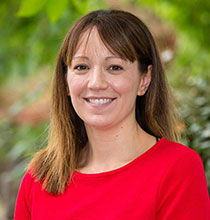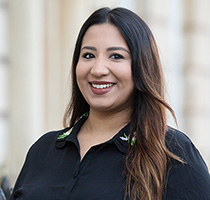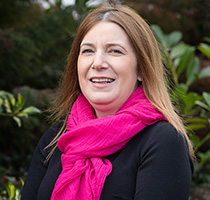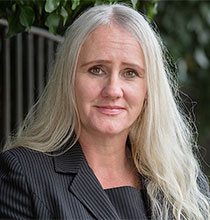The formalities of the marriage process are matched by strict rules about when and how a couple may divorce. If you think that your relationship has irretrievably broken down, talk to us. Our divorce solicitors in Bristol and Winterbourne can advise you on the steps you should take and we’ll be alongside you when you take them.
Divorce Solicitors in Bristol
-
- Carolyn Bawden-Frost
- Chartered Legal Executive
- 01454 859465
-
- Kiran Bhakerd
- Paralegal
-
- Melody Brown
- Partner
-
- Kelly Davidge
- Legal Assistant
-
- Eliza Praveen
- Paralegal
-
- Phil Thomas
- Associate Solicitor
-
- Sarwat Unar
- Paralegal
-
- Suzanne Young
- Senior Legal Assistant
-
- Nathalie Payne
- Solicitor
At Henriques Griffiths, we have been helping people in Bristol with their divorces since 1973. Our team is made up of family law specialists with many years of experience in the legal, practical and emotional aspects of divorce. We are accredited by the Law Society for Family Law and Children Law, providing independent recognition of our exceptional expertise.
We have one simple aim: to help you bring your marriage to a formal end as quickly and simply – and on the best terms – as possible.
Our divorce solicitors in Bristol and Winterbourne can provide clear, practical guidance for all of the issues involved in the end of marriage, including initiating and responding to divorce proceedings, as well as making financial settlements and arrangements for children.
We recognise that every client’s circumstances are different, requiring a tailored approach that matches your needs and concerns. We’ll get to know your situation and work with you to make sure that your future, and that of your loved ones, is taken care of.
Speak to one of our divorce solicitors now by contacting your local Henriques Griffiths office in Bristol or Winterbourne.
Or use our simple enquiry form to ask a question or request a call back.
Our divorce and family dispute resolution services
Our divorce and family dispute resolution team can guide you through every step of the process of legally ending your relationship, as well as helping to resolve the practical issues surrounding divorce and separation, such as financial settlements and arrangements for children.
Our divorce solicitors in Bristol and Winterbourne are experts in matters including:
- Divorce proceedings
- Divorce and finances
- Divorce and pensions
- Divorce and property
- International divorce
- No-fault divorce
- Arrangements for children
Divorce proceedings
We can guide you through the entire legal process of your divorce. This includes preparing and submitting your divorce application, corresponding with your ex-partner and their lawyer and applying for the Conditional Order and Final Order that are needed as part of the process.
With our expert guidance, we can minimise the likelihood of any mistakes that could see your divorce application rejected and help avoid or quickly resolve any other issues that threaten to delay your divorce.
Divorce and finances
There are often a number of different financial considerations to sort out when getting divorced, including what should happen to the marital home, how any savings, investments and other assets should be divided and what, if any, maintenance should be paid between spouses.
Our divorce lawyers are highly experienced in resolving these issues. We can provide clear divorce advice that helps to ensure you get a fair settlement that works for you and your loved ones as quickly and cost-effectively as possible.
Learn more about our expertise with divorce and finances.
Divorce and pensions
When dealing with divorce and separation, pensions are often a key concern. This is especially true where one spouse has a significant pension or pension assets and the other either has no pension or a much smaller pension.
Our expert divorce solicitors can advise you on how your pension can be dealt with, including how to make sure you get a fair share of your spouse’s pension and your options to protect your pension as appropriate.
Learn more about our expertise with divorce and pensions.
Divorce and property
Property is often one of the most valuable assets in a divorce and, when it comes to the family home, one of the most emotive as well. Our team can provide expert divorce advice in relation to property, including both the family home and investment properties.
Learn more about our expertise with divorce and property.
International divorce
Where there are international considerations, divorce can be more complicated. It is strongly recommended that you seek advice from specialist divorce solicitors with experience handling international cases. At Henriques Griffiths, we have worked with couples facing international divorce on many occasions, so can offer clear advice to match your situation.
Learn more about our expertise with international divorce.
No-fault divorce
No-fault divorce has simplified divorce proceedings, but it is still important to get specialist legal advice. This not only helps to ensure that you follow the process correctly, but also gives you the opportunity to get clear divorce advice on all of the ways ending your marriage will impact your life, including your finances and any children you have.
Learn more about our expertise with no-fault divorce.
Arrangements for children
Deciding what should happen to any children you and your partner have together is often one of the most contentious issues during divorce. The emphasis always needs to be on the wellbeing of your children, while protecting your right to a meaningful relationship with them.
A number of our team specialise in children law, so we can help you explore your options and negotiate a solution amicably with your ex-partner wherever possible or support you in taking court action where required.
Learn more about our expertise with arrangements for children.
Divorce FAQs
How long does a divorce take?
The legal proceedings to end your marriage will take a minimum of 26 weeks (six months). This is because the process involves two mandatory wait periods (firstly, a wait of 20 weeks before applying for the Conditional Order and then a further wait of six weeks before applying for the Final Order than legally ends your marriage.)
However, you also need to factor in the time needed to agree the division of finances and, if you have children, arrangements for them.
Every couple is different so there is no set formula for working out how long these aspects of your divorce will take. In a straightforward divorce (where the couple is mostly in agreement and/or where there are no complex financial arrangements to work out), these aspects usually takes around four-six months to deal with.
However, there are many factors that can affect the length of the process, such as:
- How swiftly you and your spouse are able to come to an agreement about matters such as the financial settlement or arrangements for any children
- Whether there are any particularly complex aspects of your divorce, such as international aspects or family businesses
What are the ‘grounds’ for divorce?
There is only one ground for divorce – the irretrievable breakdown of the relationship. Previously, you were required to prove this by citing one or more of five accepted ‘facts’ or ‘reasons’ for the breakdown of the relationship in your divorce application (see below).
However, this is no longer required. This is because the Divorce, Dissolution and Separation Act 2020 came into force in April 2022, meaning you simply need to give a ‘statement of irretrievable breakdown’ in your divorce application, without providing a reason for it.
The five ‘facts’ or ‘reasons’ you previously needed to rely on where:
- Adultery
- Unreasonable behaviour
- Separation for two years with the consent of your spouse
- Separation for five years, no consent needed
- Desertion by your spouse for at least two years
The need to rely on these reasons could often cause additional conflict during the divorce or mean people had to wait years before applying for a divorce. This change has therefore helped to remove the potential for unnecessary conflict and barriers in divorce.
Does it matter who starts the divorce?
The outcome of the divorce will not be affected by who starts the process. However, the person who starts (the ‘applicant’) may have more control over how quickly the proceedings move forward.
For example, the applicant can apply for the Final Order six weeks and one day after the Conditional Order is issued. However, if the applicant does not apply for the decree absolute, their spouse has to wait a further three months to apply.
The only circumstances in which it might make a significant difference who starts the divorce process is where there is an international element to the divorce and you disagree over which country’s jurisdiction you wish the divorce to take place in. Generally, the country where divorce proceedings are first filed is the country where the divorce will be handled.
How long do you have to be separated before you can divorce?
There is no set time that you have to be separated before you can apply for divorce.
Previously, you needed to be separated for at least two years if you wished to use this as the reason for the breakdown of your marriage (with both spouses’ consent) or five years (if one spouse did not consent). However, since the Divorce, Dissolution and Separation Act 2020 came into force in April 2022, this no longer applies.
Does adultery or unreasonable behaviour affect the outcome of divorce?
The conduct of either spouse will not have any impact on the divorce proceedings or division of finances. The only way in which a spouse’s behaviour may affect the divorce is where there are children you need to make arrangements for and one spouse has acted in a way that puts the children at risk of harm. This would then be considered by a court when deciding child arrangements.
What is no-fault divorce?
Divorce law in England and Wales changed in April 2022 with the introduction of ‘no-fault’ divorce. This means that, as covered above, couples no longer need to rely on one or more of the five ‘facts’ to prove the irretrievable breakdown of the relationship when applying for a divorce. All they need to do is provide a statement that the relationship has irretrievably broken down. This removes the need to ‘blame’ the entire divorce on one spouse. It is also no longer possible to object to the divorce, saving individuals from lengthy and stressful court battles.
Couples can also now submit joint divorce applications, acknowledging that divorce is usually a mutual decision. A spouse can still make an application by themselves (a ‘sole application’) if they wish.
Do you have to go to court to get a divorce?
Most couples do not have to go to court to get a divorce (other than submitting the paper applications). If you and your spouse are able to come to an agreement about matters such as childcare, maintenance payments and the division of finances, there is no need for court proceedings.
You can either sort out children and financial matters informally between yourselves, with the input of a divorce solicitor, or using methods of alternative dispute resolution such as mediation or collaborative law.
Our specialist divorce solicitors will help you explore all possible options before opting for court proceedings. However, in the event that an application to court is necessary, we will represent your best interests and fight for a positive outcome on your behalf.
What are you entitled to in a divorce settlement?
In England and Wales, matrimonial finances are divided according to the reasonable needs of the separating couple and any children. Matrimonial finances can include:
- The family home
- Pensions
- Savings and investments
- Belongings such as cars and furniture
- Businesses
You must also work out matters such as how debts will be paid going forwards and any child maintenance and spousal maintenance agreements.
What is a ‘fair’ split does not necessarily mean an ‘equal’ split. You should take into account factors such as:
- Your incomes and future earning capacity
- Your financial needs
- Who will primarily look after the children and their needs
- Your contributions to the marriage over the years (including non-financial contributions such as raising the children or taking care of the family home)
The final settlement may be an uneven split to reflect the different needs and resources of each spouse.
Our expert divorce solicitors can help you work through financial issues and sort out a settlement that provides you with financial security and reflects your contributions to your marriage over the years.
How much does a divorce cost?
The cost of your divorce will depend on the circumstances. There are court fees to pay as part of your application and you will also need to pay solicitors’ fees for any legal advice you receive.
Generally speaking, your divorce will cost less if you can agree the details of dividing your finances and any arrangements for children amicably with your spouse. If court proceedings are required, your legal costs are likely to be substantially higher. This is one of the key reasons we are so keen to encourage couples to agree these matters out of court wherever possible.
Our divorce solicitors’ fees
We can offer a fixed fee divorce service for some aspects of divorce where appropriate e.g. for making or responding to a divorce application. Where ongoing support is required, our divorce lawyers may instead work to an agreed hourly rate to ensure we can best fulfil your requirements.
Our team will be happy to discuss the likely costs involved in your divorce and our fees during your initial consultation.
Why choose our divorce solicitors in Bristol?
Henriques Griffiths has been helping individuals and families to navigate divorce and the issues connected to divorce since 1973. Offering exceptional legal expertise with an empathetic and highly practical approach, our divorce lawyers aim to make dealing with divorce as easy as possible while ensuring you achieve the right outcome for you and your loved ones.
Our Law Society accreditations & memberships for divorce
Our divorce solicitors in Bristol and Winterbourne include members of the Law Society’s Family Law and Children Law panels, recognising the high standard of our legal practice in these areas. Our divorce lawyers also include a member of Resolution, specialising in non-confrontational family dispute resolution, and a specialist in domestic abuse cases.
The firm also benefits from a Conveyancing Quality Scheme accredited Residential Property team, who can assist with property issues in divorce, such as selling or transferring ownership of the family home.
Henriques Griffiths is Lexcel accredited by the Law Society in recognition of our excellent practice management and client care. We are regulated by the Solicitors Regulation Authority (SRA) providing assurance that we continually meet the highest legal and professional standards.
Contact our divorce solicitors in Bristol and Winterbourne today
Speak to one of our divorce solicitors now by contacting your local Henriques Griffiths office in Bristol or Winterbourne.
Or use our simple enquiry form to ask a question or request a call back.









